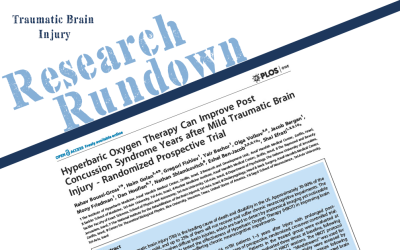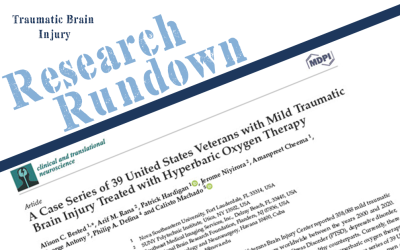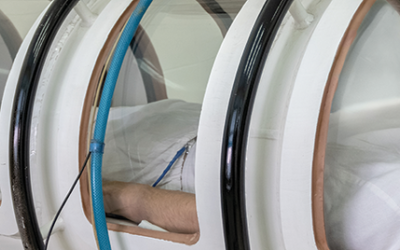As Tom Fox continues his discussion outlining the research on Hyperbaric Oxygen Therapy for brain trauma, he dives into these 5 Department of Defense (DoD) studies. All of these studies were positive studies that were spotlighted in a non-beneficial way, despite the...
Research Rundown – Episode 9: A Case Series of 39 United States Veterans with Mild Traumatic Brain Injury Treated with Hyperbaric Oxygen Therapy
In this Research Rundown we focus on Hyperbaric Oxygen Therapy for treatment of mild Traumatic Brain Injuries in Veterans. Highlights: This is a case series of 39 United States veterans with mTBI (mild Traumatic Brain Injury) treated with Hyperbaric Oxygen Therapy....
Hyperbaric oxygen therapy in children with post-concussion syndrome improves cognitive and behavioral function: a randomized controlled trial
Abstract Persistent post-concussion syndrome (PPCS) is a common and significant morbidity among children following traumatic brain injury (TBI) and the evidence for effective PPCS treatments remains limited. Recent studies have shown the beneficial effects of...
A Case Series of 39 United States Veterans with Mild Traumatic Brain Injury Treated with Hyperbaric Oxygen Therapy
Article cited by TreatNow.org Dr. Alison Bested, MD, and her team in Florida have published results of a case series that, once again, proves the power of Hyperbaric Oxygenation to stop suicidal ideation by healing brain wounds. 39 participants reported reduced pain,...
Treatment of Traumatic Brain Injury With Hyperbaric Oxygen Therapy
Hyperbaric oxygen therapy (HBOT) is defined as the use of oxygen at higher than atmospheric pressure for the treatment of underlying disease processes and the diseases they produce. Modern HBOT in which 100% O2 is breathed in a pressurized chamber dates back to the 1930s, when it was first used for treatment of decompression illness in divers. There are currently 13 FDA-approved uses for HBOT, including decompression illness, gas gangrene, air embolism, osteomyelitis, radiation necrosis, and the most recent addition—diabetic ulcers. HBOT can dramatically and permanently improve symptoms of chronic TBI months or even many years after the original head injury. This assertion is generally met with skepticism within the medical establishment because we have been taught for generations that any post-concussion symptoms persisting more than 6 months or so after a head injury are due to permanent brain damage that cannot be repaired.
Reflections on the neurotherapeutic effects of hyperbaric oxygen.
Traumatic brain injury (TBI) and stroke are the major causes of brain damage and chronic neurological impairments. There is no agreed-upon effective metabolic intervention for TBI and stroke patients with chronic neurological dysfunction. Clinical studies published this year present convincing evidence that hyperbaric oxygen therapy (HBOT) might be the coveted neurotherapeutic method for brain repair. Here we discuss the multi-faceted role of HBOT in neurotherapeutics, in light of recent persuasive evidence for HBOT efficacy in brain repair and the new understanding of brain energy management and response to damage. We discuss optimal timing of treatment, dosage, suitable candidates and promising future directions.
Hyperbaric oxygen therapy can improve post concussion syndrome years after mild traumatic brain injury – randomized prospective trial.
Traumatic brain injury (TBI) is the leading cause of death and disability in the US. Approximately 70-90% of the TBI cases are classified as mild, and up to 25% of them will not recover and suffer chronic neurocognitive impairments. The main pathology in these cases involves diffuse brain injuries, which are hard to detect by anatomical imaging yet noticeable in metabolic imaging. The current study tested the effectiveness of Hyperbaric Oxygen Therapy (HBOT) in improving brain function and quality of life in mTBI patients suffering chronic neurocognitive impairments. The trial population included 56 mTBI patients 1-5 years after injury with prolonged post-concussion syndrome (PCS). The HBOT effect was evaluated by means of prospective, randomized, crossover controlled trial: the patients were randomly assigned to treated or crossover groups.





